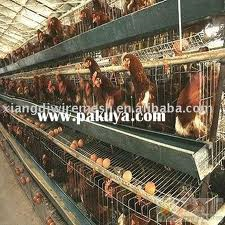Closely Confined Chickens, Interstate Conflict & the Dormant Commerce Clause
Is Proposition 2, California’s Pioneering Animal Welfare Law, Unconstitutional?

Last week witnessed a most interesting constitutional showdown between sovereign states in U.S. District Court in Sacramento. At issue is animal welfare legislation California has enacted both at the ballot box and through its elected representatives. The enemy combatants are a coalition of midwestern states led by Missouri, aligned against the State of California, with both sides represented by their respective state Attorneys General.
The dispute goes back to 2008, when California voters overwhelmingly enacted Proposition 2, formally known as the Prevention of Farm Animal Cruelty Act. The initiative measure, which takes effect on January 1, 2015, prohibits the confinement of egg-laying hens in cages that don’t allow the chickens to turn around, lie down, stand up and fully extend their limbs. (Unfortunately, many if not most egg-laying chickens–in California and nationwide–are currently kept in extremely confined cages and pens for their entire lives.)
California farmers subsequently brought numerous litigation challenges to Proposition 2, though none of them has been successful to date. Shortly after the initiative’s passage, however, animal welfare advocates and California farmers had a collective epiphany: Proposition 2 seemingly only applies to California farm operations, thus putting California agriculture at a competitive disadvantage compared to out-of-state farmers who sell their eggs to California-based buyers but are not subject to Proposition 2’s explicit mandates. To level the playing field, California agriculture and the successful proponents of Proposition 2 joined forces (in one of California’s odder political alliances of recent years) to successfully lobby the California Legislature in 2010 to enact legislation, AB 1437, applying the same animal welfare requirements to eggs produced at out-of-state chicken farms for shipment to and sale in California. AB 1437, like Proposition 2, takes effect on January 1, 2015.
Recently, the State of Missouri, joined by Nebraska, Oklahoma, Alabama and Iowa, sued California Attorney General Kamala Harris, seeking to challenge Proposition 2 and AB 1437–at least as they affect egg farmers in those states. Their key argument is that the more humane chicken cage requirements mandated under these California laws violate dormant Commerce Clause principles and should therefore be invalidated. Under dormant Commerce Clause rules, state and local laws may not discriminate against interstate commerce, regulate “extraterritorially” (i.e., beyond state borders) or unduly interfere with interstate commerce.
U.S. District Court Judge Kim Mueller heard California Attorney General Harris’ motion to dismiss Missouri’s lawsuit last week. Assuming she rules on the states’ dormant Commerce Clause arguments (her comments from the bench suggest Judge Mueller has concerns about the states’ standing to bring the lawsuit), the judge will be faced with an interesting set of arguments.
On the one hand, it’s hard for Missouri to argue that Proposition 2 and AB 1437 discriminate against interstate commerce. After all, AB 1437 in particular simply made the Proposition 2 standards equally applicable to both in-state and out-of-state egg producers who seek to sell their eggs in California. More formidable, however, is the plaintiff states’ claim that the California laws–and especially AB 1437–seek to regulate extraterritorial conduct. That’s because both the express terms and legislative history of AB 1437 make clear that the objective is to reach beyond California’s borders to make Proposition 2’s cage restrictions apply to out-of-state egg producers who want to sell their product to California consumers.
My hope and expectation is that California will ultimately prevail in its defense of Proposition 2 and AB 1437, both before the district court and in the inevitable appeal to the Ninth Circuit Court of Appeals. These modest laws seek to modify longstanding industry practices that are unquestionably inhumane; can seemingly be complied with at relatively modest cost to egg farmers; and were supported by nearly two-thirds of California voters at the polls in 2008 when they approved Proposition 2.
Meanwhile, the State of Missouri ex rel. Koster v. Harris litigation demonstrates yet again that the dormant Commerce Clause is being invoked with increasing frequency to attack a wide array of state and local environmental, public health and animal welfare laws.





Reader Comments